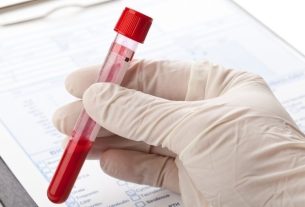Anti-thyroglobulin, or anti-TG, is an antibody produced by the body against thyroglobulin, which is a protein produced by the thyroid that helps in the production of thyroid hormones.
Therefore, the measurement of this autoantibody is indicated to investigate changes in the thyroid, mainly Hashimoto’s thyroiditis and Graves’ disease.
The anti-thyroglobulin test must be recommended by the endocrinologist together with the dosage of other tests that evaluate the thyroid, such as T3 and T4 and TSH.

What is it for
The anti-thyroglobulin test is used to evaluate the functioning of the thyroid, because it evaluates the amount of autoantibodies produced by the body against thyroglobulin, which is a protein produced by the thyroid gland. Learn more about thyroglobulin.
Thus, the anti-TG test is mainly indicated by the doctor to assess the risk of autoimmune diseases in the thyroid, especially when the person has signs and symptoms of changes in the functioning of this gland, such as excessive tiredness, difficulty losing or gaining weight, increased or decreased appetite, weak nails, and changes in mood. Check out other symptoms of thyroid problems.
How is done
The anti-thyroglobulin test is carried out by collecting a small blood sample, which is sent to the laboratory for analysis. In general, fasting is not recommended for taking the test, however some laboratories may indicate that the collection should be carried out after fasting for 4 hours.
It is important that when collecting the blood sample for analysis, the use of any medication in the last 30 days is indicated. Furthermore, if you are taking a vitamin B7 supplement, it is recommended to stop using it approximately 3 days before taking the test, as it may interfere with the results.
Reference value
The value of the anti-thyroglobulin test may vary according to the laboratory and detection method used. However, the anti-thyroglobulin value considered normal can be up to 60 IU/mL, depending on the laboratory.
What does the result mean
High anti-thyroglobulin may be a sign of:
- Tireoidite de Hashimoto;
- Graves’ disease;
- Hyperthyroidism, in some cases;
- Hypothyroidism;
- Postpartum thyroiditis.
Normally, the anti-thyroglobulin test is requested along with other tests that evaluate the thyroid, such as T3 and T4, TSH and thyroglobulin measurement. This way, the doctor can better assess the functioning of the thyroid gland, complete the diagnosis and recommend the best treatment. Discover the main tests that evaluate the thyroid.
If you wish, make an appointment with the nearest endocrinologist to evaluate anti-thyroglobulin levels and thyroid function:
Taking care of your health has never been easier!
Bibliography
- UNIVERSITY OF ROCHESTER – MEDICAL CENTER. Thyroid Antithyroglobulin Antibody. Disponível em: <https://www.urmc.rochester.edu/encyclopedia/content.aspx?contenttypeid=167&contentid=thyroid_antithyroglobulin_antibody>. Acesso em 09 jun 2023

Sign up for our newsletter and stay up to date with exclusive news
that can transform your routine!
Warning: Undefined array key "title" in /home/storelat/public_html/wp-content/plugins/link-whisper-premium/templates/frontend/related-posts.php on line 12
Warning: Undefined array key "title_tag" in /home/storelat/public_html/wp-content/plugins/link-whisper-premium/templates/frontend/related-posts.php on line 13



